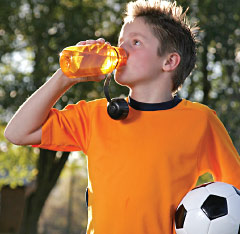Nutrition for Sports
Eating a balanced diet is key to sports nutrition
Dear Doctor,
I am concerned about the amount of sugar my very active 8 and 11 year olds consume especially in sports drinks. Do you have any recommendations for nutrition and hydration during sports?

Dear Jessica,
First of all some basics: When you eat a balanced diet and drink enough water, your body will produce energy efficiently for growth and activity including sports. Eating a balanced diet is key to sports nutrition. The right combination of fuel (calories) from carbohydrates, proteins, and fats gives you energy for top performance.
Here are some good general guidelines for sports nutrition:
- Eat meals that are carbohydrate-based (cereal, sandwiches, pasta).
- Eat heavy meals 3 to 4 hours before an event.
- In hot weather, tank up on liquids 2 hours before an event, to allow time for the body to eliminate any excess fluid.
- If desired, choose small portions of easily digestible foods (not fatty), within an hour before the event to not only provide fuel, but also prevent hunger.
There is no need for young athletes or most anyone, for that matter, to consume sports drinks other than during exercise.
For example fuel up before exercise with an easy to digest meal or snack and drink a little extra water, low-fat milk or juice for fluids. Some pre-exercise meal suggestions include cereal with milk, a turkey sandwich, fruit smoothie, pasta, bagel with a little peanut butter... with portions that vary according to what will feel comfortable and be well tolerated.
Drink enough fluids throughout the day to ensure hydration. The children should need to urinate every two to four hours, and the urine should be a pale yellow color. Drink 3 to 6 ounces of water or sports drink every 10 to 20 minutes throughout competition.
Drinking these beverages continually provides superfluous calories and additionally, they can be highly damaging to the teeth, especially in youngsters.
Replenishing fluids lost to sweat is the primary concern during an athletic event. Sports drinks are designed for use during non-stop exercise that lasts for more than 60 to 90 minutes. They generally contain water, some form of sugar, flavoring, coloring, and a dash of salt. There is no need for young athletes or most anyone, for that matter, to consume sports drinks other than during exercise. The typical American diet provides more than enough electrolytes (i.e. sodium) to replace sweat losses, as well as more than enough calories to contribute to weight gain!
And there is a downside to sodas, sugary juice drinks, and sports drinks. Many have not only high sugar content in the form of high fructose corn syrup or just plain sucrose, but they are also acidic. Drinking these beverages continually provides superfluous calories and additionally, they can be highly damaging to the teeth, especially in youngsters. The constant sugar feeds the oral bacteria promoting acid production responsible for decay, and the acidic nature of the drinks themselves can cause enamel erosion. It takes the saliva about 30 - 60 minutes to neutralize acid in the mouth so that one drink every hour means your child's mouth is always acidic, increasing the risk of both decay and erosion just when many newly erupted teeth are most vulnerable to attack.

